|
|
|
Sort Order |
|
|
|
Items / Page
|
|
|
|
|
|
|
| Srl | Item |
| 1 |
ID:
079922


|
|
|
|
|
| Publication |
2007.
|
| Summary/Abstract |
Studies of cultural differentiation have shown that social mechanisms that normally lead to cultural convergence-homophily and influence-can also explain how distinct cultural groups can form. However, this emergent cultural diversity has proven to be unstable in the face of cultural drift-small errors or innovations that allow cultures to change from within. The authors develop a model of cultural differentiation that combines the traditional mechanisms of homophily and influence with a third mechanism of network homophily, in which network structure co-evolves with cultural interaction. Results show that in certain regions of the parameter space, these co-evolutionary dynamics can lead to patterns of cultural diversity that are stable in the presence of cultural drift. The authors address the implications of these findings for understanding the stability of cultural diversity in the face of increasing technological trends toward globalization.
|
|
|
|
|
|
|
|
|
|
|
|
|
|
|
|
| 2 |
ID:
090857


|
|
|
|
|
| Publication |
2009.
|
| Summary/Abstract |
Perpetrators of genocide are likely to use a variety of tactics to reduce outrage from their actions. The main sorts of tactics are covering up the actions, devaluing the target, reinterpreting the actions in ways that minimise seriousness and responsibility, using official channels to give an appearance of justice, and using intimidation and bribery. The 1994 Rwandan genocide reveals ample evidence of all these tactics. Critics of genocidal behaviour should expect the use of these tactics and be prepared to counter them. A focus on tactics concerning outrage over genocide is a complement to the usual approaches looking at history, psychology, social dynamics, causes and responsibility.
|
|
|
|
|
|
|
|
|
|
|
|
|
|
|
|
| 3 |
ID:
170617
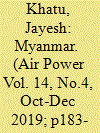

|
|
|
| 4 |
ID:
133835
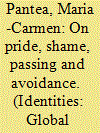

|
|
|
|
|
| Publication |
2014.
|
| Summary/Abstract |
Roma ethnicity is one of the most stigmatised identities of today's Europe. An emerging discourse on 'Roma pride' aims to reshape this widespread perception, especially among the educated youth. Drawing on 57 interviews with young people with/in higher education in Romania, this article looks into their experiences of self-identification as Roma. On the one hand, this article identified a tendency for young people to move in a conceptual space, dominated by an understanding of ethnicity as bounded and static. On the other hand, it identified an emerging tendency for flexible, hybrid identifications that deliberately avoid reifying ethnicity (e.g. being a Roma of a different kind and living beyond ethnic labels). The article calls for more informed approaches addressing ethnic identification, which avoid assumptions of stable identification and embrace more complex understandings of the social dynamics involved.
|
|
|
|
|
|
|
|
|
|
|
|
|
|
|
|
| 5 |
ID:
129850
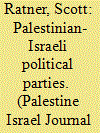

|
|
|
|
|
| Publication |
2014.
|
| Summary/Abstract |
Ever since the deterioration of the Israeli-Palestinian peace process following the outbreak of the second intifada in late 2000, it has been widely acknowledge that relations between the Israeli and Palestinian political establishments have become strained almost to the breaking point. However, far less attention has been directed to the Palestinian-Arab-Israel (PAI) parties whose transformation and pivotal role in the social and political dynamics of the conflicts should not be underestimated.
|
|
|
|
|
|
|
|
|
|
|
|
|
|
|
|
| 6 |
ID:
137632
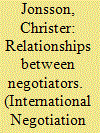

|
|
|
|
|
| Summary/Abstract |
Negotiation can be seen as a dynamic social process. Perspectives emphasizing the social context and dynamics of negotiations have been largely neglected in the negotiation literature. This article addresses the question of why social relations have received such scant attention, reviews the existing literature on negotiation as a social process, and spells out some ingredients of a social contextual approach. Finally, by way of illustration, such an approach is applied to international negotiations. Whereas ideas about social dynamics emanate from a focus on individuals, international negotiations take place at a level of aggregation and representation most remote from the individual level. Yet, even at this macro level, social context matters in negotiations.
|
|
|
|
|
|
|
|
|
|
|
|
|
|
|
|
| 7 |
ID:
131376
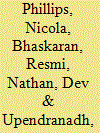

|
|
|
|
|
| Publication |
2014.
|
| Summary/Abstract |
The resilience of the problem of child labour in the global economy has been amply documented, but, we suggest, the reasons for this situation have not yet been fully captured in the associated debates. Our aim is to advance a way of thinking about those forms of child labour which occur in the context of global production networks (gpns), and to contend that greater attention must be paid to the organisation and functioning of gpns, and the social foundations on which they rest, if we are to grasp more fully the conditions and processes which facilitate the persistence and evolution of child labour. The way of thinking we propose is rooted in the concept of 'adverse incorporation' in the global economy, which we develop by drawing together currents in gpn analysis and poverty research to explore the commercial and social dynamics in gpns which give rise to these forms of labour exploitation. We illustrate our arguments with reference to the garments industry in New Delhi, India.
|
|
|
|
|
|
|
|
|
|
|
|
|
|
|
|
|
|
|
|
|